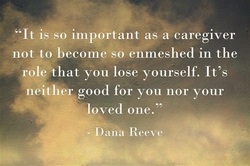 Last week I wrote about the reality many of us face at one time or another during our lives; that of being a caregiver for another person, whether it’s a parent, child, spouse, sibling, or other person. Last week I attended a support group for caregivers of individuals with Alzheimer’s, and heard a very interesting illustration I wanted to share with you. The facilitator pointed out that if you had a glass that was filled half-way with a liquid, some might say that the glass is half-empty, and others might say that it is half-full. We know that people tend to be somewhat “hard-wired” as either optimistic or pessimistic, with one more likely to see the positives and another more likely to identify the negatives in life. However, the point of this illustration wasn’t whether the glass was half-empty or half-full. The point was that if you have to hold that glass for an hour, you can probably do that. If you have to hold it for six hours, you might be able to do that. But if you have to hold it for 24 hours, you’ll likely get too frustrated, fatigued, shaky, or downright exhausted to continue holding the glass. The point was this: when you are a full-time caregiver, whether you have a positive attitude or a more pessimistic attitude, you are likely to eventually experience frustration, fatigue, and total exhaustion. Are you caring for a child with autism or some other developmental or physical disability? A parent with Parkinson’s or Alzheimer’s? A spouse with mental illness? I hope you can find help with the burden of around-the-clock caregiving. Respite programs, support groups, coffee with friends, a few minutes to do something you enjoy, or time to focus on something other than the questions/problems/activities of providing care for another person are likely to enable you to take up the glass again later. And I’m finding that if others know of the needs, they are likely to want to help!
0 Comments
Your comment will be posted after it is approved.
Leave a Reply. |
Social IncitesSocial Incites™ are insights which incite (encourage) personal and interpersonal growth. Social Incites™ are written by Laurel Hoekman, Certified Family Life Educator, Certified Employment Training Specialist, Social Coach, Consultant, and Registered Social Service Technician (Michigan). For 15 years, Laurel was the Executive Director of The Gray Center for Social Learning and Understanding, and has also been a CASA volunteer (Court Appointed Special Advocate for children who are abused and neglected). She is passionate about helping individuals and families (including those affected by autism spectrum disorders) identify and achieve their goals, particularly in building and maintaining effective social connections. Archives
April 2023
|
Social Incites, LLC, 1100 Cobblestone Road, Holland, MI 49423, 616.422.5886


 RSS Feed
RSS Feed